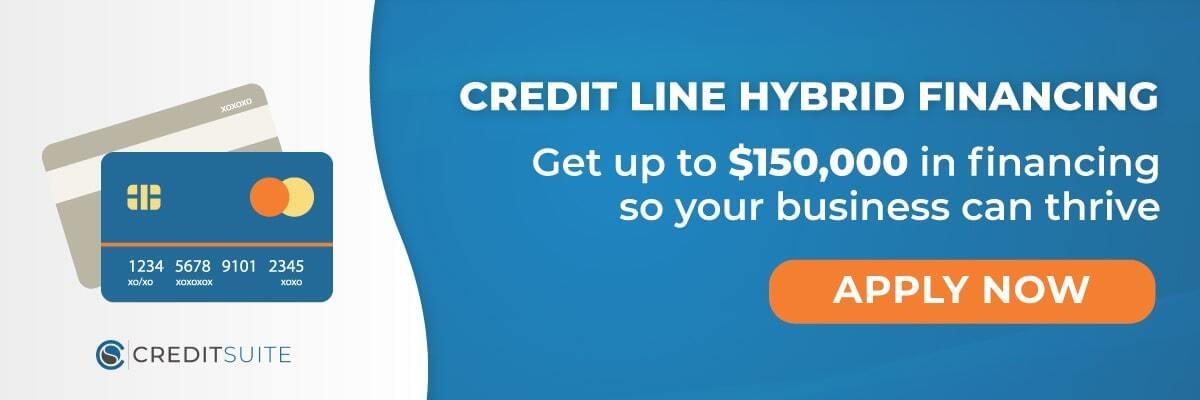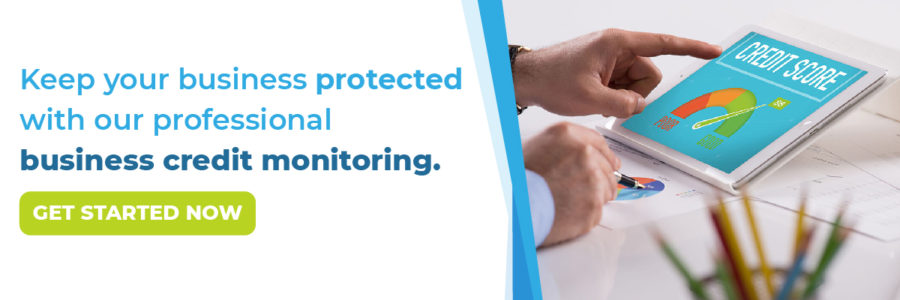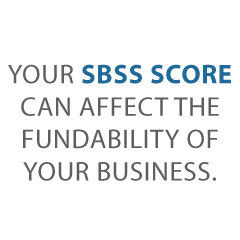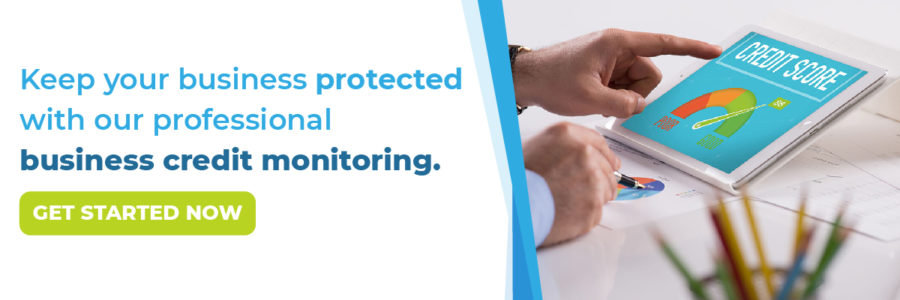Experian is one of the big three credit reporting agencies. Equifax and Dun & Bradstreet are the other two. In fact, Experian keeps business credit profiles on 99.9% of all American companies. Furthermore, it boasts the most in-depth information on small and midsize businesses. Knowing this, it is easy to see why your Experian business credit score is important.
Your Experian Business Credit Score: How to Start It, Build It, and Keep It Strong
Obviously, the score is important. As a result, it is necessary to know how Experian gets their data on your business. How do they calculate your Experian business credit score? What does their report tell lenders? More than that, can you improve your score if it isn’t great?
Keep your business protected with our professional business credit monitoring.
How to Start Your Experian Business Credit Score
According to Experian, all their information comes from third parties. This means you cannot add any information to your company credit profile. That said, you can still review your report for mistakes.
You still have to ensure your business is set up properly. If it isn’t, third parties will not recognize your company as a business. You have to establish your business as an entity separate from yourself. Otherwise, your business transactions will get mixed up with personal transactions. They may show up on your personal credit report. This will cause a huge tangle of a mess.
To separate your business from yourself, make sure your business has the following.
- EIN
- Separate contact information
- A dedicated business account
- Also, you have to formally incorporate
Experian business Credit Score: Intelliscore
You have to set up your business to be separate from yourself so your business accounts will report to the business CRAs. With Experian, the main business credit score and report is the Intelliscore Plus. Along with your Experian business credit score, the report contains the following:
Identifying Information
First, there is the standard identifying information. This includes company name and address, in addition to any ownership information. This part also lists important personnel and the type of company you have. Time in business, number of employees, and the amount of yearly sales are also in this section.
Payment Information at a Glance
After this, there is a section that lists how delinquent payments are, along with how many days late they are. It also provides an overall trend. For example, the lowest and highest balance for the past six months. Current balance is also shown. So it shows the credit limit available to your business. And this is how the report gives an idea of the credit utilization rate for your company.
In addition, this part lists the number of tradelines your business holds. It also includes how many times a company has checked your credit and any UCC filings.
It also shows the percent of businesses doing worse than yours as well. The number of bankruptcies, liens, and judgments are in this section too.
Credit Summary
The credit summary shows your business’s Experian credit score. Also, it links to information on what goes into the score and tips on the best ways to improve it.
Payment Summary
Next, you see the payment summary. There are line graphs for monthly and quarterly payment trends. Conveniently, it also shows where the numbers come from. There is even a graph that shows the monthly payment trend in relation to the what is average for the industry.
Below this, there are three bar charts showing payment trends for the past 6 months. This is as reported from the tradelines.
Trade Payment Information
The next part is about how your business has done with its payments, broken down by type of account.
Inquiries
Next up are inquiries into your small business’s credit. The list names companies making inquiries and the month the inquiry was made.
Collection Filings
If your company has any collection filings, the listing is here by date. It includes collection agency name, status, amounts, and the close date, if appropriate.
Collections Summary
The summary is relatively self-explanatory. It is just below the collection filings portion.
Keep your business protected with our professional business credit monitoring.
Commercial Banking, Insurance, Leasing
Here, Experian lists all the data it has on your business relationships. Specifically, this includes relationships with insurance, commercial banking, and leasing companies. For example, how much credit was extended? When did the loan start? What is the remaining balance, if any?
Judgment Filings
Next is the report on legal information. It includes the court where a judgment was filed, the date, and how much it was for.
Tax Lien Filings
Tax lien filing information is similar to judgment filings. The only difference is there is a listing for a filing location instead of court.
UCC Filings
In this section you will see the following information related to UCC filings:
- Date
- filing number
- jurisdiction
- name of the secured party
- activity on the filing.
UCC Filings Summary
Just beneath is the UCC filings summary, broken down by filing period and type of filing.
Business Owner Profile
Experian will also include an entrepreneur profile for smaller companies. The purpose is to show the relationships between you, the person, and your business. This automatically links the credit history of more than 5 million business owners to their business credit report.
It makes it much easier for your creditors to access your personal credit. This aids them in determining your overall creditworthiness. That’s important. It means that you can do the work to establish separate business credit. But your personal credit still matters. But this is in some cases.
Experian Business Credit Score: Intelliscore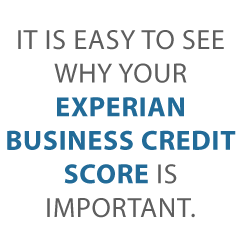
The Intelliscore Plus credit score is a credit-risk evaluation based on statistics. The goal is to help businesses, investors, and prospective lenders make decisions about creditworthiness.
It’s similar to how lenders use your personal credit score. Before they decide to lend money to you, they check your credit score. The Intelliscore Plus can provide an idea of the credit risk associated with a specific business.
Intelliscore Plus Credit Score Range
The scores range from 1 to 100. The higher your score, the lower your risk class. Alternatively, the lower your score, the higher your risk class. The chart below describes each range and what it means to lenders.
Score Range Risk Class
76 – 100 Low
51 – 752 Low – Medium
26 – 503 Medium
11 – 254 High – Medium
1 – 105 High
How Is an Intelliscore Plus Credit Score Calculated?
In the credit world, Intelliscore Plus is one of the best tools for predicting risk. One reason is that they identify key factors that show how likely a business is to pay their debt.
There are over 800 of these factors. However, they can all fit into the following general categories.
Payment History
Not surprisingly, this is how well you are making payments. It includes the number of times your accounts become delinquent. It also shows the percent of accounts that are currently late. Your overall trade balance is listed too.
Frequency
Frequency refers to the amount of times your accounts have been sent to collections. It includes the number of liens and judgments you may have. Any bankruptcies related to your business or personal accounts also show up here.
In addition, frequency has to do with your payment patterns. Were you regularly slow or late with payment? Did you start off paying bills late but get better over time?
Financial
This specific factor focuses on how you use credit. For example, how much of your available credit is currently in use? Do you have a high ratio of delinquent balances in relation to your credit limits?
If you are about to start a business or are somewhat new to this game, the list above may seem a bit overwhelming. But what if your business is not yet in operation? Or you do not have a long history of business transactions? Then how will they rate you?
In this case, a blended model is used to establish your score. That means they consider your personal consumer credit score with your business’s credit score.
Other Experian Reports
Experian offers a number of other products as well. These include reports designed to help you as the owner monitor your business credit.
- Business Credit Advantage Plan
This one is currently $149 monthly and contains mobile-friendly alerts and score improvement tips.
This report is currently priced at $49.95. It features comprehensive financial payment data and predictive information on payment behavior.
This is the least expensive of the reports, currently priced at $39.95. Basically, it includes comprehensive business and credit information. Also, there is a summary of financial payment data.
This report sells for $99 right now. It shows the value of your company and contains Key Performance Indicators. Additionally, it shows your business’s fair market value.
Keep your business protected with our professional business credit monitoring.
Premium Corporate Profiles
Experian also furnishes premium corporate profiles at an addition cost. The enhanced profiles contain even more detail including:
- Sales figures
- size
- contact details
- products and operations
- credit summary
- any Uniform Commercial Code (UCC) filings
- fake business names
- payment and collections history
This is in addition to the data supplied in their basic corporate profiles. They also have information on credit inquiries made in the past nine months.
Credit Alerts
Not surprisingly, you can subscribe to business credit alerts. Experian’s Business Credit Advantage program serves as a self-monitoring service. You get unlimited access to your business’s business credit report and score. You can make use of this tool for proactively handling your business credit. Alerts are sent for:
- Company address changes
- Changes in your business credit score
- Credit inquiries on your business profile
- Newly-opened credit tradelines
- Any USS filings
- Collection filings and
- Any public record filings, for example, liens, bankruptcies, and judgments
There are ways to monitor your Experian business credit score for a fraction of the cost. Be sure to do your research.
How Do You Improve Your Experian Business Credit Score?
If your Experian business credit score isn’t the best, there are a few things you can do to improve it. It takes time, but it is possible.
Make On-Time Payments Consistently
Paying your bills on time will help establish your small business as one that meets financial obligations. This will eventually help push your score up. As a result, lenders will view your business as low risk.
Use the Credit
Keep your debt low. That’s good advice. Still, opening business credit accounts can help raise your credit score. The key is to use all credit responsibly.
Keep Your Personal Credit in Check
By now, you’re aware that your personal credit is fair game when it comes to your Intelliscore Plus score. Running a business is hard work. However, don’t let your personal finances suffer. See to it you stay on top of your personal debt. Steer clear of credit checks that are not necessary. Basically, do not compromise your personal credit for business needs.
Your Experian Business Credit Score is Vital to Funding Approval, But There is More
Your credit score from all of the business credit reporting agencies is important. Each one can affect your ability to get funding. One isn’t more important than the other. This is because you never know which agency a lender may use.
However, credit score isn’t the only thing that matters. Business credit scores are just one piece of overall business fundability. There is so much more to it. Fundability as a whole is much more complicated than just business credit. The bigger picture is just as important.
What makes up this bigger picture? There are a number of things that go into fundability. For example, you have to have all of the licenses necessary to run your business. In addition, there has to be consistency in your business information across all platforms. Of course, your business has to be set up to be fundable as well. All of this and more comes together to form the complete fundability of your business. Are you wondering if your business is fundable? Take a minute and do an analysis of fundability and see what you find out.
The post Everything You Need to Know About Your Experian Business Credit Score appeared first on Credit Suite.


